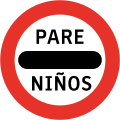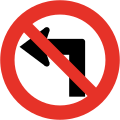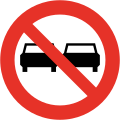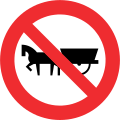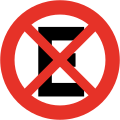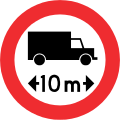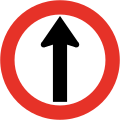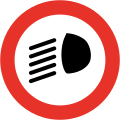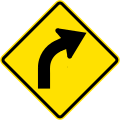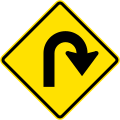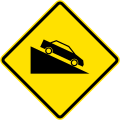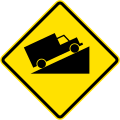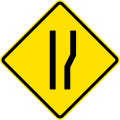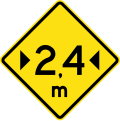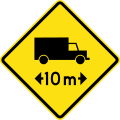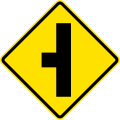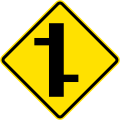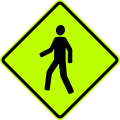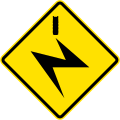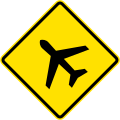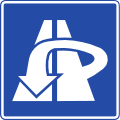Road signs in Chile

Road signs in Chile are regulated in the Manual de Señalización de Tránsito, which is based on both the United States' MUTCD and the Vienna Convention on Road Signs and Signals, to which Chile is a signatory.[1] Therefore, road signs are compliant with international standards. Chile uses yellow diamonds for warning signs in common with most of the rest of the Americas. Speed limit signs are a red circle with a white background and the limitation in black, and are in kilometres per hour. There are also some signs unique to Chile. Chile also currently uses a mixture of both types of mandatory signs: European-style signs with white symbols on a blue background and a white border, and signs with black symbols on a white background and a red border.
Chile signed the Vienna Convention on Road Signs and Signals on November 8, 1968 and ratified it on December 27, 1974, making it the only country in the Americas to ratify this convention.[2]
Chile drives on the right.
Formerly, Highway Gothic was the official typeface on Chile's road signs. New Chilean road signs use Ruta CL, a typeface designed for Chile's road signs.[3]
Regulatory signs
[edit]The priority section includes three signs: Give Way, Stop, and Stop for Children. The give way sign indicates to drivers that they must slow down and give way to vehicles on the approaching road, but that they do not need to stop if there is enough room to join or merge. The stop sign indicates to drivers that they must come to a complete stop before joining the approaching road, and is reserved for situations where a raised risk of an accident exists if drivers were not to fully stop before proceeding. The stop for children sign is used by crossing guards, and indicates to drivers that they must come to a complete stop and wait while children cross the road.
The prohibition section includes signs that are used to prohibit and limit certain vehicles from using the road or from making certain movements/actions. Prohibitions are indicated by a red circle with a 45 degree slash from left to right.
-
RPO-1
No entry -
RPO-2a
No left turn -
RPO-2b
No right turn -
RPO-2c
No U-turns -
RPO-3
No overtaking -
RPO-4
No changing lanes -
RPO-5
No trucks -
RPO-6
No motor vehicles -
RPO-7
No buses -
RPO-8
No cycles -
RPO-9
No motorcycles -
RPO-10
No tractors or other slow-moving vehicles -
RPO-11
No horse-drawn vehicles -
RPO-12
No hand-carts -
RPO-13
No parking -
RPO-14
Disabled parking only -
RPO-15
No stopping -
RPO-16
No pedestrians -
RPO-17
No stopping on the checkered pavement (see: box junction) -
RPO-18
No honking
Restriction signs
[edit]The restriction section includes signs that are used to limit the use of the road based on certain characteristics of the road itself, such as limited height. This section also includes the "end of prohibition or restriction" sign which marks the end of any prohibitions and restrictions of the road.
-
RR-1
Maximum speed limit (50 km/h) -
RR-2
Minimum speed limit (40 km/h) -
RR-3
Two-way traffic -
RR-4
Weight restriction (10 tonnes (11 short tons)) -
RR-5
Weight restriction (2 tonnes per axle) -
RR-6
Height restriction (4.2 metres (14 ft)) -
RR-7
Width restriction (2.4 metres (7.9 ft)) -
RR-8
Length restriction (no vehicles over 10 metres (33 ft) long) -
RR-9
End prohibition or restriction (in this case, the overtaking prohibition has ended) -
RR-10
Electronically tagged vehicles only
Mandatory signs
[edit]The obligation section includes signs directing road users to directions and actions they must take or obey. This includes marking one-way streets, mandatory turns and lane control.
-
RO-1aL
One-way street (leftwards) -
RO-1aR
One-way street (rightwards) -
RO-1b
Two-way street -
RO-1c
Pedestrian zone -
RO-2a
Keep right -
RO-2b
Heavy vehicles keep right -
RO-3a
Turn left only -
RO-3b
Turn right only -
RO-3c
Go straight ahead only -
RO-4
Give preference to oncoming traffic -
RO-4
Give preference to uphill traffic -
RO-5L
Pedestrians walk on your left -
RO-6a
Pass on the right -
RO-6b
Pass on the left -
RO-6c
Pass on either side -
RO-6d
Mini-roundabout -
RO-7a
Customs checkpoint -
RO-7b
Police checkpoint -
RO-8
Snow chains mandatory -
RO-9
Low-beam headlights required -
RO-10
Motorcycles only -
RO-11a
Pedestrians and cyclists keep your side on path -
RO-11b
Pedestrians and cyclists keep your side on path -
RO-12a
Buses only in right lane -
RO-12b
Buses only in left lane
Permission signs
[edit]The authorization section includes signs informing road users of actions that are allowed.
-
RA-1a
Right turn on red light permitted with caution -
RA-1b
Left turn on red light permitted with caution -
RA-2
Reserved parking
Warning signs in Chile are diamond-shaped much like in the US and Canada.
Environment signs
[edit]-
PG-1a
Gentle curve to the right -
PG-1b
Gentle curve to the left -
PG-2a
Sharp curve to right -
PG-2b
Sharp curve to left -
PG-3a
Winding road first curve to right -
PG-3b
Winding road, first curve to left -
PG-4a
Double gentle curve to the right -
PG-4b
Double gentle curve to the left -
PG-5a
Double sharp curve to the right -
PG-5b
Double sharp curve to the left -
PG-6a
Hairpin curve to right -
PG-6b
Hairpin curve to left -
PG-7a
Steep descent -
PG-7b
Steep descent (trucks) -
PG-7c
Steep ascent -
PG-7d
Steep ascent (trucks) -
PG-8a
Speed bumps ahead -
PG-8b
Speed bump (position) -
PG-9
Uneven road -
PG-10
Dip
Other environment signs
[edit]-
PF-1a
Road narrows ahead on both sides -
PF-1b
Road narrows ahead on right side -
PF-1c
Road narrows ahead on left side -
PF-2
Narrow bridge -
PF-3a
Road widens ahead on both sides -
PF-3b
Road widens ahead on right side -
PF-3c
Road widens ahead on left side -
PF-4
Weight restriction ahead (10 tonnes (11 short tons)) -
PF-5
Height restriction ahead (4.2 metres (14 ft)) -
PF-6
Width restriction ahead (2.4 metres (7.9 ft)) -
PF-7
Length restriction ahead (vehicles over 10 metres (33 ft) long)
Intersection signs
[edit]-
PI-1a
Railway crossing ahead without gates or barriers -
PI-1b
Railway crossing ahead with gates or barriers -
PI-2a
Railway crossing -
PI-2b
Railway crossing with multiple tracks -
PI-3
Roundabout ahead -
PI-4a
Crossroads ahead -
PI-4b
T-junction ahead -
PI-4c
Y-junction ahead -
PI-4dL
Minor road ahead on left -
PI-4dR
Minor road ahead on right -
PI-4eLR
Staggered crossroads, first to the left -
PI-4eRL
Staggered crossroads, first to the right -
PI-4fL
Traffic merging on the left -
PI-4fR
Traffic merging on the right
Other signs
[edit]-
PO-1
Two-way traffic ahead -
PO-2
Watch for cyclists -
PO-3
Watch for farm vehicles crossing -
PO-4
Watch for horse-drawn vehicles crossing -
PO-5
Cattle area -
PO-6
Deer area -
PO-7
Pedestrians -
PO-8
Pedestrian crossing ahead -
PO-9
Children -
PO-10
Playground -
PO-11
Traffic lights ahead -
PO-12
Give way sign ahead -
PO-13
Stop sign ahead -
PO-14
Cyclist crossing ahead
Special signs
[edit]-
PE-1
Watch for falling rocks -
PE-2
Slippery road -
PE-3
Loose gravel -
PE-4
Danger of electrical overhead wires -
PE-5
Tunnel -
PE-6
Unprotected waterfront or quayside -
PE-7
Airport or airfield nearby -
PE-8
Dangerous wind gusts -
PE-9
Edge drop -
PE-10
Avalanche zone -
PE-12
Danger
Temporary signs
[edit]-
PT-1
Road workers ahead -
PT-2
End of road workers -
PT-3
Traffic flagger ahead -
PT-4
Watch for construction vehicles
Informative Signs
[edit]-
IP-1
Alternative route -
ID-1a
Exit (Type A) -
ID-1b
Exit (Type B) -
ID-1
Countdown beacon to next exit (100 meters away) -
ID-1
Countdown beacon to next exit (200 meters away) -
ID-1
Countdown beacon to next exit (300 meters away) -
IS-1a
First aid (Type A) -
IS-1b
First aid (Type B) -
IS-2a
Information (Type A) -
IS-2b
Information (Type B) -
IS-3a
Telephone (Type A) -
IS-3b
Telephone (Type B) -
IS-4a
Petrol (Type A) -
IS-4b
Petrol (Type B) -
IS-5a
Post office (Type A) -
IS-5b
Post office (Type B) -
IAA-1
Begin of motorway -
IAA-2
End of motorway -
IAA-3
Exit -
IAA-4
Exit ahead -
IAA-5
Return route -
IAA-6
Parking ahead for 2 km -
IAA-7
Emergency telephone
See also
[edit]References
[edit]- ^ "MANUAL DE SEÑALIZACIÓN DE TRÁNSITO" (PDF). www.mtt.gob.cl (in Spanish). 2020.
- ^ "United Nations Treaty Collection". treaties.un.org. Retrieved December 7, 2023.
- ^ "Manual de Señalización de Tránsito - Conaset". Conaset (in Spanish).



